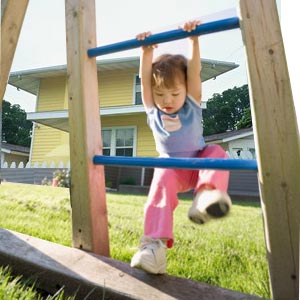Developmental Milestone

From the time of birth, every child goes through stages of physical/biological, sensory-motor, emotional and cognitive growth. A number of factors cast their influence and impact positively or negatively in several ways. Developmental milestones are general guidelines to evaluate your child's growth.
As you proceed to understand developmental milestones, it helps to accept and acknowledge that each child is unique and develops differently. Each child is an individual with his/her own unique style and pace of growth. The physical, social, emotional and cognitive development can't be compared nor will adhere to a set of expectations.
Child development Vs growth
A baby's brain is just about a quarter of the weight of an adult brain. The period of growth is so rapid in the first few years of a child that the helpless infant becomes a confident child in a matter of years, learning new skills. Often there is a tendency to equate the terms development and growth. Before you proceed to understand developmental milestones that are appropriate to your baby's age, do remember that development is entirely different and is not the same as growth. Growth refers to physical development i.e. increase in height and weight and other body changes. On the other hand, development refers to skills developed by the child as he/she ages.
Child developmental milestones
What is a milestone? The term denotes a stone marker, usually placed along the road. A milestone indicates the distance covered or traveled on the road. In the same context, as a child sets on his/her life's journey, developmental milestone relates to the skill that a child acquires within a specific time frame. Using this as a base or a guide, parents and physicians assess or monitor a baby's main areas of development. It is pertinent not to arrive at hasty conclusions, if you feel the child is lagging in any developmental area.
Every parent yearns to watch his or her baby grow. It is a gradual process taking place in a sequential fashion. Each new skill that is developed is dependent on the successful accomplishment of previous steps. The popular phrase 'you've got to walk before you run' aptly describes the relevance of sequential element part of milestones development.
A baby's brain is just about a quarter of the weight of an adult brain. The period of growth is so rapid in the first few years of a child that the helpless infant becomes a confident child in a matter of years, learning new skills. For example, a child learns to walk between the ages of 9 and 15 months only after it has learnt to crawl and pull up to a standing position. Similarly, developmental milestones are segregated according to the age of the child.
Important development milestones
Cognitive development: Thinking skills that enable a child to learn and solve problems. This includes learning, understanding, problem solving, reasoning and recollecting.
Social and emotional development: Child's ability to interact with others, developing relationships within and outside the family. Self-control, self-help and cooperation also form part of this. It is normal for a child to be relatively stronger in one social and/or emotional aspect and lesser in another.
Speech and language development: The child's ability to understand what others say. He/she learns to utter sounds, words and sentences in relation to age.
Fine motor skill development: This is the child's ability to use hands. He/ she uses hands to eat, to pick up small objects, dress, draw, play, hold a spoon.
Gross motor skill development: refers to usage of large group of muscles. He/she can sit, stand, walk, run, able to keep balance and change positions with little support.
Nurture your child
Cordial relationship between parents, a friendly, tension-free atmosphere, the kind of attention your little one gets- these are some of the crucial factors that cause an impact throughout the development stages. Particularly the emotional and behavioral responses are highly influenced by what the child experiences at home, community and school.
- Give lots of love and attention, make the child feel loved and wanted. Hugging, holding, listening can convey that you care for him/her.
- Encourage and discourage where required with reasons.
- Engage in combined reading, develop interest in reading. Helps to develop a broader perspective of the world. Reading aloud can help the child understand many a concept, develop the imagination and make for hours of fun spent together.
- Be discreet in TV viewing together. Fix limited time for viewing. Answer questions such as why he/she can't view a specific program. Instead focus of images and vocabulary as these are crucial to the growth of the child.
- Every child years for the mother or father to play, sing, dance with him/her.
- Imbibe good values, behavior through self conduct
- Recognize specific talent, skills and provide appropriate help to develop.
- Try and mimic little sounds when the baby begins to babble, as this will encourage and spur the language development process.
Top of the Page: Developmental Milestone
Tags:#child development milestones #child development
 Parenting
Parenting Stages of Growth
Precocious Puberty
Nutrition for Kids
Developmental Milestone
Empty Nest Syndrome
Infants
Sudden Infant Death Syndrome
Infant Gas Drops
Milk Allergy in Infants
Infant Reflux
Infant Nutrition
Infant Bathing
Infant Toy
Infant Colic
RSV in Infants
Asthma in Infants
Infant Brain Development
Babies
Baby Milestone
Baby Teething
Toddler Food Recipe
Baby Nursery Furniture
Baby Food Tip
Baby Monitor
Baby Burping
Children Care
 Regular Bedtime for Toddlers
Regular Bedtime for Toddlers Child Care
Kid Summer Camp
Kid Gym
Tween Parenting
Benefits of Breastfeeding
Oppositional Defiance Disorder
Attention Deficit Hyperactivity Disorder - ADHD
Kid Homework Help
Fine Motor Skill
Family Parenting
Single Parenting
Specialty Toy
Child Playhouse
Playgroup
Causes of Child Obesity
Autistic Child
Learning Disability
Toddler Activity
Activities for Toddlers
Child Safety Tip
Child Safety on the Net
Allergies in Toddlers
Top of the Page: Developmental Milestone
Popularity Index: 100,655

